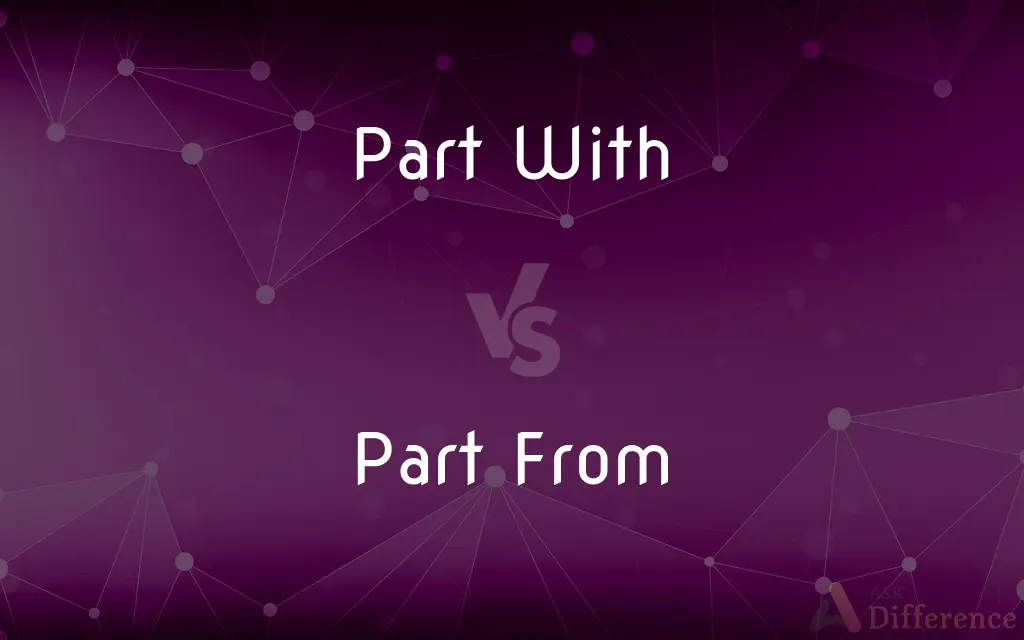Part With vs. Part From — What's the Difference?
By Tayyaba Rehman — Published on November 14, 2023
"Part with" means to give up possession or let go, while "part from" means to leave or separate from someone or something.

Difference Between Part With and Part From
Table of Contents
ADVERTISEMENT
Key Differences
Part with" and "part from" are both idiomatic expressions in English, each bearing its distinct meaning. The phrase "part with" implies relinquishing possession or letting go of something, especially when it's done unwillingly or with reluctance. For example, it's often difficult for collectors to part with their cherished items. On the other hand, "part from" usually connotes leaving or separating from someone or something. It often carries an emotional weight, suggesting a sense of loss or sorrow. For instance, parting from a loved one can be an emotional experience.
In terms of usage, "part with" is generally followed by an object or possession, whether it's tangible, like money or a keepsake, or intangible, like memories or secrets. On the contrary, "part from" typically precedes a person or location, indicating a separation. To illustrate, one might part with a treasured book but part from a dear friend.
Both expressions convey the essence of detachment, but they do so in slightly different contexts. "Part with" usually implies that a decision was made to relinquish something, while "part from" suggests the act of leaving or distancing oneself. However, context plays a pivotal role. One can part with a thought (release it) and part from a group (leave it).
It's essential to note that these phrases, while distinct, can sometimes be used interchangeably in poetic or more abstract contexts. Still, understanding their primary meanings ensures clear communication.
Comparison Chart
Definition
To give up or let go of something
To leave or separate from someone or something
ADVERTISEMENT
Usage
Followed by an object or possession
Precedes a person or location
Context
Often implies a decision was made to relinquish
Suggests the act of leaving or distancing
Emotional Connotation
Reluctance or unwillingness to let go
Sense of loss or sorrow from separation
Examples
Parting with money, secrets
Parting from a friend, a place
Compare with Definitions
Part With
Part With denotes giving up, often reluctantly.
He didn't want to part with his old guitar.
Part From
Part From signifies an emotional farewell.
It was heart-wrenching to part from her best friend.
Part With
Part With signifies letting go of an item.
It's hard for me to part with books I've read.
Part From
Part From means to leave or separate.
It's difficult to part from family.
Part With
Part With implies releasing or giving away.
Would you part with that painting for the right price?
Part From
Part From denotes distancing oneself.
He decided to part from the group at the crossroad.
Part With
Part With means to relinquish possession.
She couldn't part with her childhood toys.
Part From
Part From implies moving away or leaving behind.
She had to part from her hometown for college.
Part With
Part With indicates surrendering ownership.
He had to part with his car to pay off debts.
Part From
Part From indicates a physical or emotional separation.
They decided to part from each other for a while.
Common Curiosities
Is "part from" usually associated with emotion?
Yes, "part from" often carries a sense of loss or sorrow.
When might someone "part with" money?
When purchasing items, settling debts, or donating.
How is "part from" typically used?
"Part from" is used to denote leaving or separating from someone or something.
What does "part with" generally imply?
"Part with" implies giving up or letting go of something, often reluctantly.
Can "part with" refer to intangible things?
Yes, one can "part with" memories, secrets, or feelings.
Is "part with" only about physical possessions?
No, it can also refer to intangible possessions like thoughts or emotions.
Can these phrases be used in poetic contexts?
Yes, both can be used poetically or abstractly.
Which phrase indicates a decision to relinquish?
"Part with" usually indicates a decision to relinquish.
Can you "part from" a location?
Yes, one can "part from" a city, house, or any location.
Does "part with" always suggest unwillingness?
Often, but not always. Context matters.
Is "part with" always used in negative contexts?
No, while often implying reluctance, it can be neutral or even positive, like parting with items for charity.
How does "part from" relate to farewells?
"Part from" can signify an emotional farewell or goodbye.
What might cause someone to "part from" a group?
Differences in opinion, diverging paths, or personal reasons.
Can "part from" indicate a temporary separation?
Yes, one can "part from" someone with plans to reunite later.
Share Your Discovery

Previous Comparison
Unit Plan vs. Lesson Plan
Next Comparison
Distant Future vs. Near FutureAuthor Spotlight
Written by
Tayyaba RehmanTayyaba Rehman is a distinguished writer, currently serving as a primary contributor to askdifference.com. As a researcher in semantics and etymology, Tayyaba's passion for the complexity of languages and their distinctions has found a perfect home on the platform. Tayyaba delves into the intricacies of language, distinguishing between commonly confused words and phrases, thereby providing clarity for readers worldwide.











































